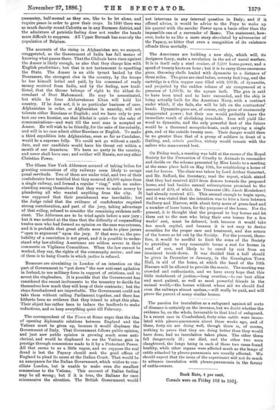The fifteen New York Aldermen accused of taking bribes for
-granting concessions of city railways seem likely to escape penal servitude. Two of them are under trial, and two of their 'confederates have testified that they received £4,000 apiece from a single railway, and formed a regular "ring," with an under- standing among themselves that they were to make money by plundering all who wanted anything from the city. It was supposed that their punishment was inevitable; but the Judge ruled that the evidence of confederates required strong corroboration, and part of the jury, taking advantage -of that ruling, refused to consider the remaining evidence suffi- cient. The Aldermen are to be tried again before a new jury ; but it was noticed at the time that the difficulty of empanelling twelve men who had formed no opinion on the case was extreme, and. it is probable that great efforts were made to place jurors 4' open to argument" upon the jury. If that were so, the pro- bability of a conviction is not great, and it is possible to under- stand why law-abiding Americans are seldom severe in their comments on Vigilance Committees. When the law cannot be worked, they say, the rights of the community revive ; and one .of them is to hang Courts in which justice is refused.






































 Previous page
Previous page